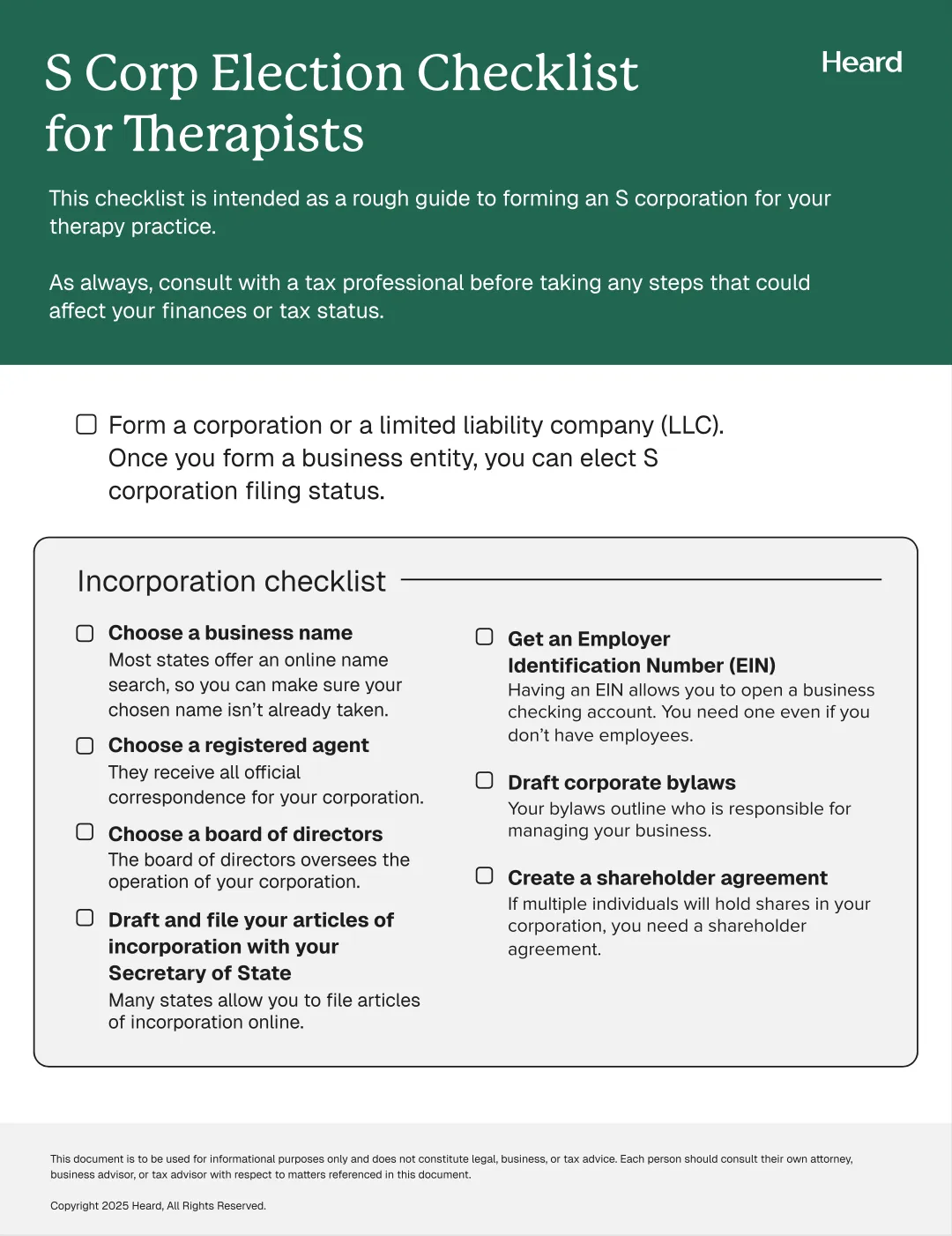If you’re a self-employed therapist, you may be asking yourself whether it’s time for your practice to become an S corporation.
Many new solo practices start out as sole proprietorships, only to make the switch to S corporation later on.
But why?
Electing S corp status takes time, energy, and often an outlay of cash. So what makes it so appealing to therapists who run their own practices?
Here are the five biggest benefits of switching to an S corp for your therapy practice.
Refresher: Your therapy practice and S corporation status
The moment you start earning your own income, the IRS considers you a sole proprietor. That means you and your business are one and the same for tax purposes.
All your income and expenses are reported on Form 1040, Schedule C. In addition to income tax, you pay self-employment tax on all earnings.
An S corporation is a pass-through tax structure. When you elect S corp status, your business becomes a separate business entity. At the same time, the S corp isn’t taxed separately. All tax liability passes on to shareholders.
Typically, therapy practices elect S corp status by first registering as limited liability companies (LLCs) at the state level, then filing the necessary paperwork to be recognized as an S corporation by the IRS. It’s the cost of registering as an LLC in the state where you operate that puts a dent in your cash reserves.
If all of this information is brand new to you, get started with these articles before deciding whether S corp status is right for you:
- The Complete Guide to S Corporations for Therapists
- The Complete Guide to LLCs and PLLCs for Therapists
- When Should My Therapy Practice Become an S Corp?
{{resource}}
You have more control over how your income is taxed
One of the most common reasons therapy practices elect S corporation status is that it gives them more control over how they pay taxes on their income.
When you’re a sole proprietor, every dollar you earn is taxed at your personal income tax rate. On top of that, you must pay self-employment tax, which is 15.3% of your net income.
To pay yourself with an S corporation, it’s necessary to become an employee on payroll. You earn a salary from your own business, but you can also take money out of your practice as shareholder distributions.
Here’s where that extra control over tax payments comes in. You more or less pay self-employment tax on income you earn as your own employee. 7.65% of your income is withheld, with a matching 7.65% contributed by your S corp (this is called FICA). But you’re not required to pay self-employment tax on shareholder distributions.
For instance, your practice might earn $100,000 over the course of the year. You take $60,000 of that as salary, and your S corp withholds income tax and FICA.
Then, if you wanted, you could take the remaining $40,000 as a shareholder distribution. You would still be required to pay income tax on that $40,000, but you would not need to pay self-employment tax. Simply by avoiding the 15.3% self-employment tax, you’d save $6,120.
So you can see why the S corporation business structure is attractive to solo therapists earning significant income. That being said, you need to make sure you’re paying yourself a “reasonable salary.” The IRS doesn’t want you taking 100% of your profits as shareholder distributions, and completely dodging self-employment tax.
You can learn more from our article on how to set a reasonable salary as a therapist.
You decrease your personal liability
True to its name, a limited liability company reduces the personal liability of its members. And since therapy practices electing S corp status typically do so after forming LLCs at the state level, that means you enjoy a greater level of protection compared to what you would get from being a sole proprietor.
Remember, as a sole proprietor, you and your business are identical. All your business’s debts are your own debts. If you borrow money to get your business off the ground, or fall behind on rent payments, it’s your own assets that are on the line.
So, what type of liability protection does an LLC (and, by extension, an S corp) offer?
That depends on:
- The laws of the state where your LLC is registered; and
- The corporate veil.
The corporate veil is the tangible separation of your personal assets from your business assets. You maintain it in a number of ways:
- By keeping personal and business funds in separate bank accounts
- By never using business funds to cover personal expenses, and vice versa
- By maintaining an up-to-date, accurate set of books (learn more about bookkeeping for therapy practices)
- By making sure you have all the insurance coverage required for LLCs by State law
So long as you maintain the corporate veil, you can enjoy the liability protection your S corp / LLC offers.
Depending on laws in the state where you operate, that could mean that, if you decide to dissolve the business, you will not be personally liable for any debts the business owes. For instance, if your practice has a business credit card, you’re not required to pay it off with personal funds when you dissolve the business.
It also means that, if your practice falls behind or fails to make debt payments, creditors can’t come after personal assets like your car or your house.
All of this liability protection depends on you maintaining good business practices (leaving the corporate veil intact) and being properly insured. For more information about LLCs and liability in your state, consult with a CPA.
{{resource}}
You benefit from pass-through status
When your therapy practice is an S corporation, your income is only taxed once. Assuming you own 100% of the S corp, you pay your personal income tax rate on 100% of its net income, and 100% of your earnings as an employee are charged both income tax and FICA. But the S corporation, as an entity, does not pay its own taxes.
At the same time, you enjoy many of the benefits of a C corporation, such as:
- The ability to bring on shareholders (whether business partners, investors, or employees) and award them distributions
- Limited liability, because you register for LLC status at the state level
- A separate business entity that can be bought, sold, or passed on to a family member when you retire
In contrast, a C corp pays tax both on its total earnings as a corporation, and any income you earn in the form of salary or dividends is also taxed.
Plus, forming a C corporation is typically more costly and time-consuming than registering an LLC and electing S corp status, and annual tax filing is more complex and costly.
You’re prepared to expand your practice
Even if you run a solo therapy practice now, an S corporation creates the framework to expand into a larger practice with employees, contractors, and shareholders.
Once your S corp is set up, you have what you need to:
- Hire employees. You have to set up payroll for your therapy practice to pay yourself. Once payroll is set up, you have a system in place to hire more employees and pay them while making all the necessary withholdings for tax purposes. (Check out our guide to payroll for therapists.)
- Bring on investors. The S corp business structure allows you to assign shares of your business to individuals. That’s helpful if you decide to sell shares in the business and raise funds to help you expand.
- Partner with other therapists. The S corp business structure also works well for partnerships. If you decide to partner with other therapists, you can all take on shares of the business (and with them shares of its profits).
- Sell or pass on the practice. Since the S corp structure makes your practice a separate entity from your person, you’re able to sell it to buyers or even pass it on to family members.
If you have any plans to grow your practice beyond your own personal caseload, the S corp structure gives you what you need to do so.
{{resource}}
You get access to new tax strategies
Control over how much self-employment tax you pay—by dividing your income into wages and shareholder distributions—is the most appealing feature of the S corporation business structure.
But this strategy can work in tandem with other tax moves to maximize your savings. And there are other methods of saving money on taxes that become easier to employ once your business is an S corporation:
- Claiming the qualified business income (QBI) deduction. This can reduce your income tax burden by as much as 20%, and it’s especially attractive when combined with the tax savings you enjoy by taking shareholder distributions.
- Renting your home office to your business. For up to fourteen days of the year you can rent a portion of your home to your own S corp, both writing off the cost as a business expense and receiving tax-free income as an individual.
- Hiring your kids. When you hire family members to work for your practice, they can earn up to $12,000 per year without paying taxes—and their wages are tax deductible.
For a deeper dive, check out our article on tax optimization strategies for S corp therapy practice.
—
Still learning your way around the ins and outs of the S corp structure? Check out our complete guide to S corporations for therapists.
This post is to be used for informational purposes only and does not constitute legal, business, or tax advice. Each person should consult their own attorney, business advisor, or tax advisor with respect to matters referenced in this post.
Bryce Warnes is a West Coast writer specializing in small business finances.
{{cta}}
Manage your bookkeeping, taxes, and payroll—all in one place.

Discover more. Get our newsletter.
Get free articles, guides, and tools developed by our experts to help you understand and manage your private practice finances.





